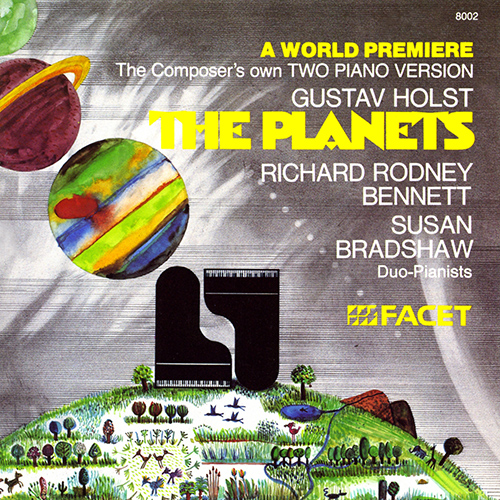HOLST, G.: Planets (The) (version for 2 pianos)
Tracklist
Bradshaw, Susan (piano)
Bradshaw, Susan (piano)
Bradshaw, Susan (piano)
Bradshaw, Susan (piano)
Bradshaw, Susan (piano)
Bradshaw, Susan (piano)
Bradshaw, Susan (piano)
Bradshaw, Susan (piano)
A musician of great versatility, the English composer Richard Rodney Bennett studied in London with Lennox Berkeley and Howard Ferguson, and subsequently with Pierre Boulez. In addition to his very varied work as a composer, he is also known as a pianist, not least in jazz performances. He was made a CBE in 1977 and knighted in 1999.
Operas, Ballet and Film Music
Bennett’s operas date from the 1960s and include the powerful The Mines of Sulphur as well as Victory, based on Conrad. His ballet score Isadora was written in 1980. His film music includes scores for Far from the Madding Crowd, Murder on the Orient Express and Four Weddings and a Funeral.
Orchestral and Chamber Music
Bennett wrote concertos for a number of different instruments, including two piano concertos and concertos for violin, viola, oboe, saxophone, double bass, horn and bassoon. There is a similarly wide range of scoring in his chamber music, which includes a Guitar Concerto and a Sonatina for the same instrument.

Gustav Holst, of Scandinavian ancestry on his father’s side, was born in the English spa town of Cheltenham in 1874 and studied music at the Royal College in London, using his second study, the trombone, to provide an income. He later became director of music at St Paul’s Girls’ School, retaining this connection until the end of his life. His music had a variable reception in his lifetime, but he exercised a strong influence on later English composers.
Stage Works
Holst wrote a number of works for the theatre, their subjects reflecting his varied interests, from Hindu mythology to Shakespeare and the medieval world of the Wandering Scholar. From his final chamber opera The Perfect Fool, first staged in 1923, with its parodies of Verdi and Wagner, comes a better-known ballet suite. The opera itself is seldom performed.
Vocal and Choral Music
As a choral conductor, Holst wrote a considerable amount of choral music, accompanied and unaccompanied, including arrangements of folksongs and a smaller number of solo songs.
Orchestral Music
By far the best known of all Holst’s compositions is The Planets, a sequence of seven movements, reflecting the composer’s interest in astrology and the generally attributed qualities of each. ‘Jupiter, The Bringer of Jollity’ provided the melody for a popular patriotic hymn, while ‘Mars, The Bringer of War’, suggests the period of the work’s composition: between 1914 and 1916. For string orchestra he wrote the St Paul’s Suite, completed in 1913, and in 1933 the Brook Green Suite. The two suites for military band were written in 1911. His Suite de ballet, Op. 10 was written in 1899 and revised in 1912.































